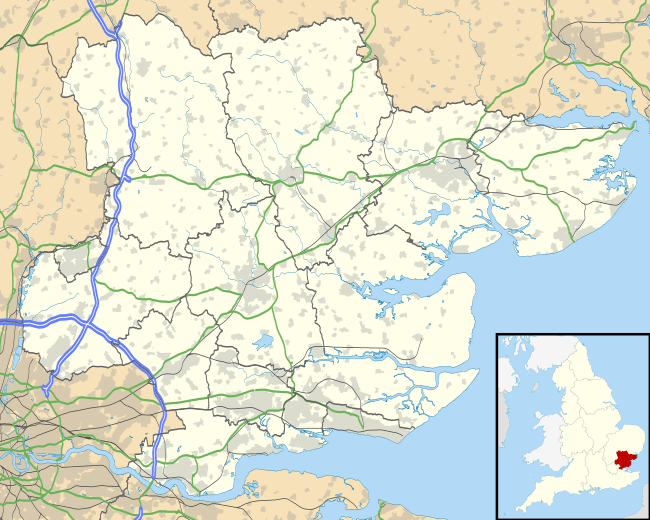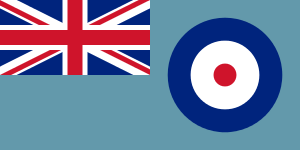RAF Rivenhall
| Royal Air Force Rivenhall USAAF Station AAF-168  | |
|---|---|
| Located Near Silver End, Essex, England | |
|
Rivenhall airfield photographed in April 1944 with the B-26 Marauders of the 397th Bombardment Group parked on the grass, while the P-51 Mustangs of the 363d Fighter Group still on the dispersal loops. | |
 RAF Rivenhall, shown within Essex | |
| Coordinates | 51°51′19″N 000°38′23″E / 51.85528°N 0.63972°E |
| Type | Military airfield |
| Code | RL |
| Site information | |
| Controlled by |
United States Army Air Forces Royal Air Force |
| Site history | |
| Built | 1943 |
| In use | 1944-1946 |
| Battles/wars |
European Theatre of World War II Air Offensive, Europe July 1942 - May 1945 |
| Garrison information | |
| Garrison |
Ninth Air Force RAF Bomber Command |
| Occupants |
363d Fighter Group 397th Bombardment Group Nos. 295, 570 Squadrons |



Royal Air Force Rivenhall or more simply RAF Rivenhall is a former Royal Air Force station located in Essex, England. The airfield is located approximately 4 miles (6.4 km) south-southeast of Braintree; about 40 miles (64 km) northeast of London
Opened in 1942, it was used by both the Royal Air Force and United States Army Air Forces. During the war, it was used primarily as a combat airfield with various fighter and bomber units. After the war, it was closed in 1946 and kept in reserve until 1956.
Today, the remains of the airfield are located on private property with the northern half being turned into a quarry.
History
USAAF use
Rivenhall was known as USAAF Station AAF-168 for security reasons by the USAAF during the war, and by which it was referred to instead of location. Its USAAF Station Code was "RL".
363d Fighter Group
On 22 January 1944, a squadron of the 363d Fighter Group arrived from RAF Keevil where it had been awaiting equipment. The group had been selected as the third in the European Theatre to be equipped with the new North American P-51B Mustang. The group consisted of the following operational squadrons:
- 380th Fighter Squadron (A9)
- 381st Fighter Squadron (B3)
- 382d Fighter Squadron (C3)
On 14 April 1944, as part of a general movement of Ninth Air Force fighter units in the Colchester area to the advanced landing grounds, the 363d moved to RAF Staplehurst. The actual movement of all elements had begun two days previously.
397th Bombardment Group
On the day following the departure of the 363d, the first Martin B-26 Marauders of the 397th Bombardment Group arrived from RAF Gosfield. The group consisted of the following operational squadrons:
- 596th Bombardment Squadron (X2)
- 597th Bombardment Squadron (9F)
- 598th Bombardment Squadron (U2)
- 599th Bombardment Squadron (6B)
The group's identification marking was a yellow diagonal band across both sides of the vertical tailplane.
Early in August, officially on the 5th, the 397th transferred from Rivenhall to RAF Hurn in Hampshire, to give the Marauders a better radius of action as the break-out of the Allied forces from the Normandy beachhead meant that potential targets were receding.
Current use
Upon its release from military use, in June 1956, Marconi leased part of the airfield and within ten years had taken over most of the surviving buildings. Today, the northern half of the former airfield has been turned into a quarry, with the vast majority of the land in the northwest of the airfield being excavated.
The perimeter track of the airfield has been reduced to a single track agricultural road. However, some of the loop hardstands still remain in the southwestern quadrant of the field. All three runways either have been quarried, or substantially reduced in width, with agriculture fields taking over the grass areas of the former airfield. A very small portion of the 28 end of the main runway still exists at full width. One T-2 hangar remains, along with a scattering of buildings. An automobile salvage yard has taken over some of the hardstands in the east end of the airfield, where once C-47s and gliders were stored. As of 2013, only one of the two T-2 hangars remain, with demolition claiming the other historical remaining buildings.
See also
References
![]() This article incorporates public domain material from the Air Force Historical Research Agency website http://www.afhra.af.mil/.
This article incorporates public domain material from the Air Force Historical Research Agency website http://www.afhra.af.mil/.
Citations
Bibliography
- Freeman, Roger A. (1994) UK Airfields of the Ninth: Then and Now 1994. After the Battle ISBN 0-900913-80-0
- Freeman, Roger A. (1996) The Ninth Air Force in Colour: UK and the Continent-World War Two. After the Battle ISBN 1-85409-272-3
- Maurer, Maurer (1983). Air Force Combat Units Of World War II. Maxwell AFB, Alabama: Office of Air Force History. ISBN 0-89201-092-4.
- USAAS-USAAC-USAAF-USAF Aircraft Serial Numbers—1908 to present
External links
| Wikimedia Commons has media related to RAF Rivenhall. |


.svg.png)